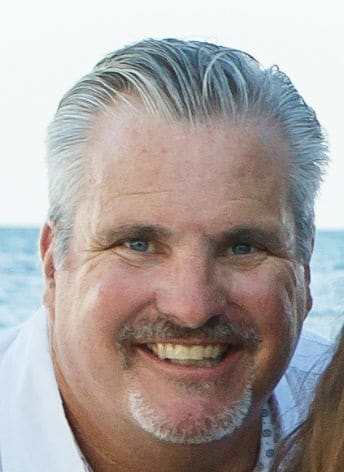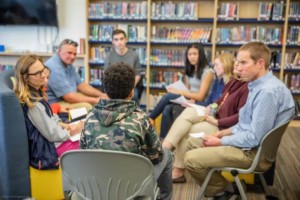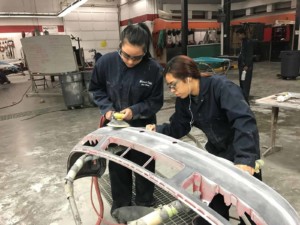Punk Rock Classrooms Brings Passion, Unity & Do-It-Yourself Mindset To Education

Education is seemingly often searching for a grounding philosophy about how to approach teaching and learning. We’ve had Teach Like A Pirate, Teach Like A Champion, and even Rockstar Teacher. All of these have resonated with different groups. But Elementary Principal Mike Earnshaw and Social Studies Teacher Josh Buckley were searching for something else. That led to the birth of Punk Rock Classrooms.
Both Earnshaw and Buckley believe that the punk rock mindset is the perfect vehicle to inspire and initiate change – both in education and in the world. They grew up witnessing the living validation of core punk rock values – passion, unity, and DIY – making a difference for themselves, their peers, and their communities. According to these two forward-leaning educators, punk rock is aligned well with creating classrooms where students are engaged, take ownership of their learning and focus on difference-making.
These two punk rock educators – who only met online two years ago and have to this day never met in person – are focused on giving all students the best education possible. Earnshaw – a longtime punk rock fan and aficionado – connected immediately with Buckley – also a longtime fan and punk rock musician. Together, they have been successfully sharing their education ideas and punk rock recommendations through their successful Punk Rock Classrooms Podcast. Earnshaw and Buckley agree that their collective mission is to promote a mindset that is really student-centered and focuses on strong relationships and a larger interpersonal context for both teachers and students in the classroom.
“Some educators are focused on test scores and it becomes too narrow. It becomes all about an external thing and they are not enjoying it,” said Earnshaw. “They are not enjoying influencing kids’ lives. If more educators embrace their passions, that’s what builds those connections.”
Buckley concurs and said that students are not only looking for meaningful connections but also opportunities to have agency. He said educators need to embrace the student voice and realize that their role is to create and amplify those opportunities.
“In punk rock terms, this is about passing the microphone. At punk rock shows, they often put the mic in the crowd and let everybody have an opportunity to yell,” said Buckley. “This DIY mentality is about letting our students run the show, letting them solve the problems and giving them ways to pursue their own ideas.”
Much of what PRC promotes aligns well with those interested in more project-based, deeper learning instruction. The concepts of student voice, relevant and engaging work, as well as taking risks is all part of a learning culture that Earnshaw says needs to be modeled and implemented from top-down. As a site leader, he said he communicates to his teachers that they can take risks and that he wants to see engaged kids who are actively involved in their learning.
“Teachers may be afraid to give control away or of what their colleagues may say,” said Earnshaw. “Some of my best teachers have classrooms that are being led by students. But leaders have to communicate that this is the culture of the school.”
It’s about getting outside of one’s comfort zone – for both teachers and students – according to Buckley. He said this is a democratization of the classroom that makes the teacher more of a facilitator and guide versus an agent of control.
“Give the classroom over to the kids. If they have an idea, let them run with it,” said Buckley. “Educators can be too comfortable being the master of their domain. We have to drop the ego.”
This is about shaking up the traditional model of how we view teaching and learning in the classroom, according to Buckley. He said we have to get away from evaluating a learning environment based on compliance.
“The idea that a good classroom is a controlled, quiet one does not align with actual learning and the real world,” said Buckley. “Kids are searching for purpose and we have to find ways to give that to them.”
In its first year, the podcast was about the ethos of punk rock, while this year has focused more on education concepts and applications of punk rock. As of late, episodes have been dedicated to real-world challenges and needs these two are facing at their school sites. These include everything from state assessments to evaluations to how to build campus culture. Although excited about the attention the podcast is receiving, Earnshaw and Buckley cling to their punk rock roots and say they are not chasing popularity or mass appeal. Rather, they are about pursuing their passions and fostering a community.
“Punk rock taught us that relationships are vital to a scene. Our classrooms and schools are our scene,” said Buckley. “We’ve been able to connect with educators all over the world and that is powerful.”
Buckley also reminds us that you don’t have to be a punk rock music fan to get what they talk about.
“ Everyone has their punk rock,” said Buckley. “It might be fishing or gardening. This is about what gets one going and how one can apply that to teaching.”
Their message and philosophy are resonating with key educational voices. Kyle Anderson, veteran ed-tech blogger, and host of the BeerEDU Podcast, is a huge fan.
“I’ve never met them, but I talk to them frequently on Twitter and Voxer. And they have been on BeerEDU twice,” said Anderson. “They are solid dudes. I love their show.”
In addition to eventually meeting in person, they say their plans are to continue with the podcast and spread the punk rock ethos to as many educators who will listen. They say they have found their tribe and just encourage other educators to do the same.
“Teachers don’t need to feel alone about their educational philosophies or ideas,” said Earnshaw. “Run with what you love should be a message for teachers as well as their message to their students.”
For more, see:
- 10 Tips For Developing Student Agency
- Follow Your Passion: Crazy or Genius?
- Take a Risk and Follow Your Own Path in Life
Stay in-the-know with innovations in learning by signing up for the weekly Smart Update.








0 Comments
Leave a Comment
Your email address will not be published. All fields are required.